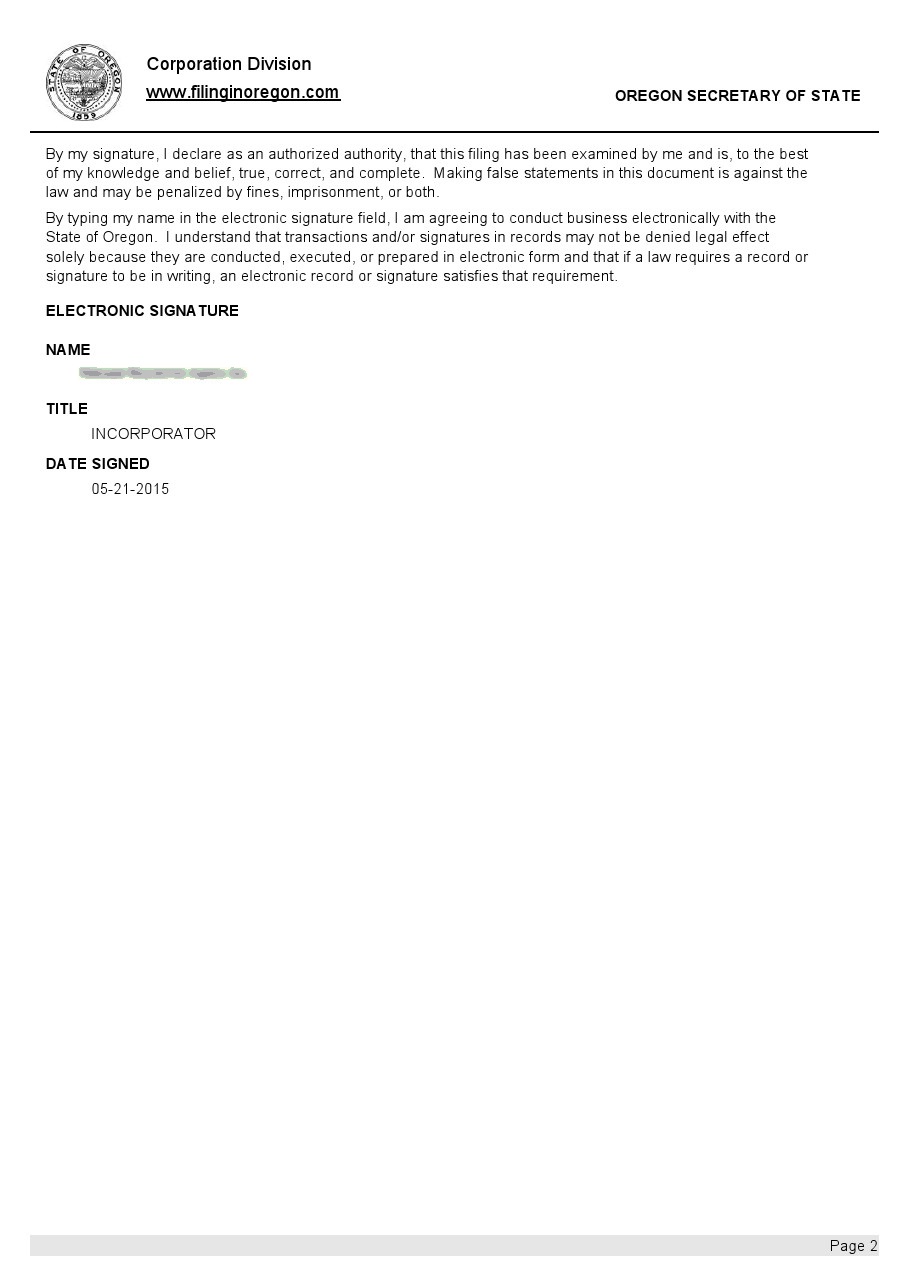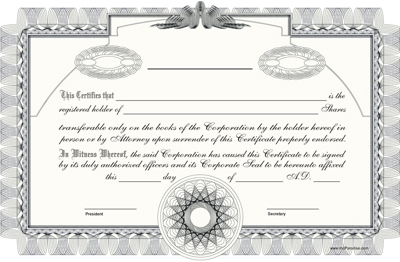Date: 06/22/2015 |
Category: |
Author: Jakub Vele
OREGON CORPORATION total only $194.00
Including Oregon State Initial Filing fee $100.00 and $89.00 fee for checking name availability,preparing Oregon state-approved Articles of incorporation, filing Articles with state, sending Articles to you.
See what’s included
Oregon additional services
Date: 07/06/2015 |
Category: |
Author: Jakub Vele
ORDER ONLINE: Use this online order form and pay by credit card.
Date: |
Category: |
Author: Jakub Vele
Oregon LLC ( Limited Liability Company )
ORDER ONLINE: Use this online order form and pay by credit card.
Date: |
Category: |
Author: Jakub Vele
Oregon Registered Agent / Resident Agent
Pricing $89.00 per year, special for pre-pay $40 per year
Don’t get fooled by companies claiming the lowest price and increasing it later. Our pricing is very simple. We charge $89 per year. We also have few specials. Whenever you decide to pre-pay additional years you get them for $40/year.
New Company
starting business
(new corporation, LLC, etc.)
Order now
Change of Agent
changing existing
agent to us
Order now
Renewals
existing clients
for OR resident agent
Order now
Why you need a Registered Agent?
Oregon State laws require business entities to maintain a Resident Agent in the state that you form your business. The agent’s name and office address are included in the Articles of Incorporation or Articles of Organization to give public notice of where to send important documents to your business entity.
If you need Registered agent in other State than Oregon click here.
We offer Registered Agent service in all 50 States.
State Fee for changing Oregon Registered Agent
Registered Agent change or resignation: $5.00
Registered Agent Requirements
A corporation must have a registered agent in Oregon whose street address is the registered office. A registered agent can be an individual or a legal entity.
Date: |
Category: |
Author: Jakub Vele
Annual Reports for Oregon Corporations & LLCs
An annual report and a non-refundable $100 processing fee are due on the first anniversary date of a corporation, LLC, LLP, or LP. The annual report form is mailed to the designated mailing address of the entity approximately 45 days prior to the due date.
No processing fee for an amendment that needs to be filed after the list is filed. Entities are allowed to update annual report as many times as necessary for no additional fee.
If you need help, we can file the annual report for you. Our fee is only $45. To order our service, please click on the following link:
Date: |
Category: |
Author: Jakub Vele
Oregon Additional Services
TAX ID (Employment Identification Number - EIN) - FREE
Self-Service: Obtaining a Tax ID number doesn’t cost any money. You can apply by phone, fax or mail. You can also call toll free at (800) 829 4933 and get EIN instantly over the phone. If you apply by fax, it takes about 4-5 business days. If you apply by mail, it takes about 3-4 weeks. Please find information about Tax ID – EIN here.
Full Service: Do you need assistance with obtaining a tax ID? We can help prepare the form and obtain the tax ID for $45. Order here Tax ID.
S CORPORATION STATUS ELECTION
What is “S Corporation”?: An “S Corporation” is a corporation that elects to be taxed under Subchapter S of the Internal Revenue Code and receives IRS approval of its request for Subchapter S status. As a legal entity (an artificial person), the S corporation is separate and distinct from the corporation’s owners (the stockholders). Under Nevada incorporation law, there is no distinction between a C corporation and an S corporation. The incorporation process is the same. However, the two type of corporate entities are subject to differing federal and state tax treatment. Our cost is $45. Order S Corporation filing here.
FINCEN BENEFICIAL OWNERSHIP INFORMATION REPORTING
We can help you submit the filing with FinCEN for your company. Companies formed in 2024 have 90 days to file initial reports after receiving official notification of their creation. Companies existing before 2024 have a deadline of January 1, 2025, for their initial reports. Those established after 2025 will have 30 days to file initial reports after registration.
Let IncParadise efficiently and affordably handle your BOI reporting with FinCEN, allowing you to focus on running your business and avoid costly compliance mistakes.
OREGON CERTIFICATE OF GOOD STANDING
A certificate of good standing (certificate of existence) is a document issued by the Secretary of State certifying that your corporation does exist legally and that it is in good standing with the state. We can obtain one for you. The fee is $89 + state fee.
OREGON APOSTILLE
In 1981, the United States joined the 1961 Hague Convention abolishing the Requirement of Legalization for Foreign Public Documents. The Convention provides for the authentication of public (including notarized) documents to be used in countries that have joined the convention. Apostille of Articles of Incorporation or other document is issued by the Secretary of State. Price is $89 + state fee.
OREGON REINSTATEMENT OF CORPORATION/LLC
If your charter was revoked and you want reinstate the company, you have to pay all due fees and penalties and file appropriate annual reports.
Do you need somebody to handle reinstatement for you? Please contact us! We charge $89. We can find out how much money you owe for state fees.
OREGON AMENDMENTS OF ARTICLES
There are times when a business needs to change the information included in the Articles of Incorporation or Articles of Organization. To do this, you need to file an amendment with the Oregon Secretary of State. Some reasons a business may need to file an amendment are to change the company’s name, to expand or alter the company’s business purpose, or to change the number of authorized shares or par value (for corporations only).
Do you need somebody to handle the filing of amendment for you? Please contact us! We charge $89 + state fees. Pay by PayPal (our email address is paypal@https://incparadise.net).
FOREIGN QUALIFICATION (all U.S. states)
Registration of foreign company qualifying to conduct business in other states: If your company expects to transact business outside your state of formation, your company may be required to qualify as a “foreign corporation” or “foreign LLC.” We can file the necessary paperwork to qualify your business as a foreign corporation or LLC in any of the 50 states.
Do you need somebody to handle foreign qualification for you? Please contact us!
Read more information about Foreign Qualification here
Foreign qualification fees
U.S. ADDRESS FOR PERSONAL OR BUSINESS USE AND MAIL FORWARDING
Do you need U.S. street address as your mailing address. Mail is forwarded once a week. We offer mail forwarding service based in Las Vegas, NV.
There are two options:
– $150 per year. $2.50 per mailout plus postage.
– $99 per year. $5.50 per mailout plus postage.
To order mail forwarding, click here.
BUSINESS LICENSE REPORT
Business licenses are mandatory for every business in the USA to operate legally. You may require federal, state, local licenses, permits, and tax regulations for your business.
Obtaining business licenses and permits is a daunting and time-consuming process as it entirely depends on the business industry, location, etc. IncParadise makes the business license process easy for you by delivering a report that lists the required federal, state, local licenses, permits, and tax regulations. Our expert research team searches, identifies and verifies the local, state, and federal licenses and permit requirements for your business type and location. They then send you the report with a list of these business license requirements so that you can save yourself time and effort.
Order Business License Report
LOCAL VOICE MAIL AND FAX. FAX TO EMAIL.
We offer brand-new local voice mail or fax number. We will also issue you a password that will allow you to access the voice mail system in order to retrieve messages and/or set up your own customized greeting. Faxes can be forwarded to your email. Service available in OREGON: Portland. More details about local voice mail and fax services.
TOLL-FREE NUMBERS
We offer the best toll-free numbers on the market. Nationwide businesses, mid-sized and small businesses, and families can order toll-free 800 services and get a number that rings directly to your home or business. Redirect it to your fax machine or cell phone and back as you change locations. Track calls on the Internet in real time. Select an easily remembered vanity number for your business. You will get: custom routing, voice mail, inbound faxing, website account management, call recording, lead generation, vanity numbers, national toll-free database search and much more!
More information here.
 702-871-8678
702-871-8678


